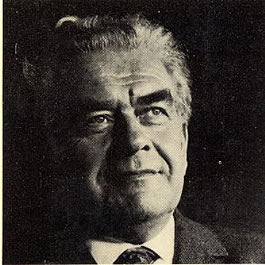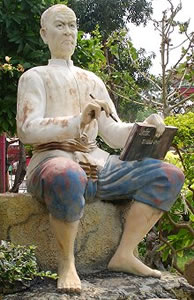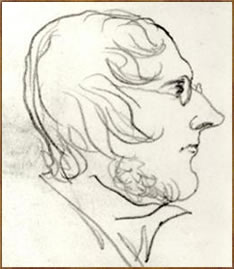De Duitse schrijver Stefan Andres werd geboren op 26 juni 1906 in Breitwies bij Trier. Zie ook mijn blog van 26 juni 2007 en ook mijn blog van 26 juni 2008 en ook mijn blog van 26 juni 2009.
Uit: Ernst Jünger / Stefan Andres – Briefe 1937 – 1970
„»Beim Aufräumen meiner Akten fand ich auch Ihre Briefe, zusammen mit manchen Abschriften der meinen an Sie. Ich sah daraus, daß wir schon lange in Verbindung stehen. Zumeist erloschen meine literarischen Bekanntschaften nach kurzer Zeit – die Existenz eines Autors durch die Jahrzehnte zu führen, scheint nicht einfach zu sein«, so schrieb Ernst Jünger (1895–1998) am 5. Februar 1948 an Stefan Andres (1906–1970) und resümierte damit einen Briefverkehr, den Andres am 12. August 1937 begonnen hatte. Der 31jährige Autor, der bereits drei Romane, mehrere Erzählungen und einen kleinen Gedichtband veröffentlicht hatte, steckte seit längerem in einer Krise.
Materielle Sorgen plagen ihn, seit er Anfang 1935 wegen seiner politischen Einstellung als freier Mitarbeiter vom Reichssender Köln entlassen worden ist. Er hat eine Familie mit zwei Kindern zu ernähren, die Einkünfte aus seiner schriftstellerischen Arbeit fließen spärlich. »In der Hauptsache bestanden die Jahre zwischen 1933 und 1937 in der täglichen Bemühung, das Existenzminimum hereinzubekommen …«.
Im nationalsozialistischen Deutschland fühlt sich Andres nicht mehr sicher, weil er mit seiner kategorischen Ablehnung des Regimes nur schwer hinter dem Berge halten kann. »Am 30. Januar [1933] saßen wir daheim, schweigend vor unserem kleinen Rundfunkgerät und hörten dann das Endgültige. Nie werde ich die Handbewegung vergessen, mit der mein Mann den Knopf ausdrehte und die prophetischen Worte sagte: ›Das bedeutet eines Tages Krieg und den Untergang unseres Vaterlandes‹«, so notiert Dorothee Andres in ihren Erinnerungen. Immer wieder bringt sich der junge temperamentvolle Schriftsteller in bedrohliche Situationen, wenn er gegen den »Drahtverhau der Verbote« rebelliert. Große Sorgen macht er sich um das Wohlergehen seiner Frau, die als Halbjüdin besonders gefährdet ist.“

Stefan Andres (26 juni 1906 – 29 juni 1970)
De Deense schrijver Martin Andersen-Nexø werd geboren op 26 juni 1869 in Kopenhagen. Zie ook mijn blog van 26 juni 2007 en ook mijn blog van 26 juni 2009.
Uit: Pelle der Eroberer
„Ein Ruf zitterte über den Hafen hin, und nach einer kleinen Weile hörte man das dumpfe Geräusch von Rudern, die über einem Bootsrand arbeiteten. Das Geräusch entfernte sich seewärts und entschwand schließlich ganz. Doch dann begann eine eherne Glocke zu läuten; das mußte auf der äußersten Mole sein. Und aus der Ferne, in der die Ruderschläge verschwunden waren, antwortete ein Nebelhorn. Sie fuhren fort, einander zu antworten, in Abständen von ein paar Minuten.
Die Stadt war nicht zu sehen, hin und wieder aber wurde die Stille da oben von den Eisen an den Holzschuhen eines Stein- oder Kaolinarbeiters auf dem Steinpflaster zerrissen. Der scharfe Takt war lange zu hören, bis der Mann plötzlich um irgendeine Ecke verschwand. Dann wurde eine Tür geöffnet, und man vernahm ein kräftiges Morgengähnen; jemand machte sich daran, den Bürgersteig zu fegen. Fenster wurden hier und da aufgerissen, und verschiedene Geräusche zogen hinaus als Gruß in den grauen Tag. »Du Schwein, hast du dich wieder naß gemacht!« schrie eine scharfe Frauenstimme. Man hörte kurze, durchdringende Klapse und das Weinen eines Kindes. Ein Schuster fing an, Leder zu klopfen, nach einer Weile fiel er mit einem frommen Lied in den Takt der Arbeit ein:
»Nur eins hat Wert auf Erden, liebe Brüder:
Das Lamm, das aller Welten Sünden trug.«
Die Melodie war einem von Mendelssohns »Liedern ohne Worte« entnommen.
Auf der Bank unter der Kirchenmauer saß die Mannschaft eines Bootes und starrte weitsichtig auf die See hinaus. Vornübergebeugt saßen sie da, die gefalteten Hände hingen zwischen den Knien herab, sie rauchten aus ihren kurzen Pfeifen. Alle drei hatten Ringe in den Ohren gegen Erkältung und andere Krankheiten, und alle nahmen dieselbe Haltung ein – als fürchte sich jeder von ihnen davor, sich auch nur im geringsten von den anderen zu unterscheiden.“

Martin Andersen-Nexø (26 juni 1869 – 1 juni 1954)
De Bengaals – Indische dichter, schrijver, essayiste en journalist Bankim Chandra Chatterjee werd geboren op 26 juni 1838 in Kanthalpura. Zie ook mijn blog van 26 juni 2007 en ook mijn blog van 26 juni 2009.
Uit: The Poison Tree (Vertaald door Miriam S. Knight)
“The Brahmans, good tranquil men, recited the praises of _Ganga_ (the sacred river Ganges) and performed their worship, sometimes, as they wiped their streaming hair, casting glances at the younger women.
In the sky, the white clouds float in the heated air. Below them fly the birds, like black dots. In the cocoanut trees, kites, like ministers of state, look around to see on what they can pounce; the cranes, being only small fry, stand raking in the mud; the _dahuk_ (coloured herons), merry creatures, dive in the water;
other birds of a lighter kind merely fly about. Market-boats sail along at good speed on their own behalf; ferry-boats creep along at elephantine pace to serve the needs of others only: cargo boats make no progress at all–that is the owners’ concern.
On the third day of Nagendra’s journey clouds arose and gradually covered the sky. The river became black, the tree-tops drooped, the paddy birds flew aloft, the water became motionless. Nagendra ordered the _manji_ (boatman) to run the boat in shore and make it fast. At
that moment the steersman, Rahamat Mullah, was saying his prayers, so he made no answer. Rahamat knew nothing of his business. His mother’s father’s sister was the daughter of a boatman; on that plea he had become a hanger-on of boatmen, and accident favoured his wishes; but he learned nothing, his work was done as fate willed. Rahamat was not backward in speech, and when his prayers were ended he turned to the Babu and said, “Do not be alarmed, sir, there is no cause for fear.”
Rahamat was thus brave because the shore was close at hand, and could be reached without delay, and in a few minutes the boat was secured.“
Surely the gods must have had a quarrel with Rahamat Mullah, for a great storm came up quickly. First came the wind; then the wind, having wrestled for some moments with the boughs of the trees, called to its brother the rain, and the two began a fine game. Brother Rain, mounting on brother Wind’s shoulders, flew along. The two together, seizing the tree-tops, bent them down, broke the boughs, tore off the creepers, washed away the flowers, cast up the river in great waves, and made a general tumult. One brother flew off with Rahamat Mullah’s head-gear; the other made a fountain of his beard. The boatmen lowered the sail, the Babu closed the windows, and the servants put the furniture under shelter.“

Bankim Chandra Chatterjee (26 juni 1838 – 8 april 1894)
De Thaise dichter Sunthorn Phu werd geboren op 26 juni 1786 in Bangkok. Zie ook mijn blog van 26 juni 2007 en ook mijn blog van 26 juni 2009.
King Rama II
I salute the Pagoda of the Holy Relics
May the true religion live forever.
I make merit, so the Buddha helps me
Increase my power to attain enlightenment.
And Id like my words, my book,
To preserve, till the end of time and heavens,
Sunthorn the scribe who belongs
To the King of the White Elephant
Uit: Sawasdi Raksa
“Early in the morning, after getting out of bed, you must refrain from anger and touchiness. Turning your face towards the East and South, you must pronounce three times an incantation according to the Buddhist formula over the water for washing your face. After washing your face with the water, the first word or sentence t
o be uttered ought to be nice and good. It will increase and enhance your noble dignity. For splendour which upholds a man’s chacrateristic properties resides in your face in the morning. During the day, the splendour resides in your body. You must take a bath and sprinkle your body with scented water. By observing this, you will be healthy and happy. During the evening, the splendour resides at both feet. You must wash your feet. No woman’s foot is allowed to be placed over yours.”

Sunthorn Phu (26 juni 1786 – ? 1855)
De Engelse dichter Branwell Brontë werd op 26 juni 1817 geboren in Thornton, Yorkshire. Zie ook mijn blog van 26 juni 2009.
Lydia Gisborne (June 1846)
On Ouse’s grassy banks – last Whitsuntide,
I sat, with fears and pleasures, in my soul
Commingled, as ‘it roamed without control,’
O’er present hours and through a future wide
Where love, me thought, should keep, my heart beside
Her, whose own prison home I looked upon:
But, as I looked, descended summer’s sun,
And did not its descent my hopes deride?
The sky though blue was soon to change to grey –
I, on that day, next year must own no smile –
And as those waves, to Humber far away,
Were gliding – so, though that hour might beguile
My Hopes, they too, to woe’s far deeper sea,
Rolled past the shores of Joy’s now dim and distant isle.

Branwell Brontë (26 juni 1817 – 24 september 1848)
Zie voor onderstaande schrijvers ook mijn blog van 26 juni 2007
De Amerikaanse toneel- en draaiboekschrijver Sidney Howard werd geboren op 26 juni 1891 in Oakland, Californië.
